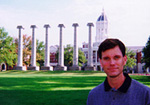
Delivery to Kenya
Humanitarian aid
arrives in African town
By Mark Ziegler
Their friendship spans two decades and two continents.
When Kenya Airways picked up its new 737 at the Boeing Delivery
Center in Seattle earlier this summer, it carried back to Nairobi
1,500 pounds of medical equipment and supplies for a clinic in
Mumias, a town not far from famed Lake Victoria and the Great
Rift Valley in the East African nation.
The shipment was part of the ongoing Boeing International Relief Delivery Flights program, in which Boeing, relief agencies and airlines collaborate to spread much-needed goodwill to foreign lands.
And it was the latest chapter in the long friendship between Dorcus Mwikhali, owner of the clinic, and Bill Lake, chairman of the board of a Los Angeles gift-packaging business, whose persistent efforts over two years helped find the medical equipment and supplies sent to Kenya.
Lake first met Dorcus, then an aspiring registered nurse, shortly after she arrived in the United States almost 20 years ago.
Sponsorship of her education at the University of Oregon Medical School had fallen through. Facing deportation, Dorcus obtained a job as a housekeeper and cook for Lake's elderly parents in Portland, including his mother, who suffered from several long-term illnesses.
The Lakes learned of Dorcus' struggles and soon offered to pay for two years of nursing school, in addition to continuing to provide the job in their home.
"My parents were always empathetic people," Lake recalled. "Dorcus had been dumped in the U.S., and she had only two options. One was go home; the other was stay."
Lake said his parents greatly enjoyed listening to Dorcus' colorful stories about her native Kenya.
"She has great qualities of a human being," he said. "She was always very willing to help out."
Lake's mother, who Dorcus described in a recent phone interview from Kenya as "very jolly" and full of "motherly advice," passed away in 1981, his father in 1985. Dorcus eventually graduated, worked as a nurse in a Portland hospital, married and gave birth to five children.
Lake and Dorcus kept in touch over the years, and in the mid-1980s he helped finance the return of Dorcus and her family to Kenya.
Once in Nairobi, the nation's capital, Dorcus began "working in a hospital ward built in 1864, with no electricity and lots of flies," according to Lake. All the while, she was "living in a hut with a dirt floor ... and then her husband leaves."
Later, Dorcus returned to her hometown of Kakemega to establish her own medical clinic, one without electricity. Two years ago, she relocated the clinic to a better facility -- with power -- in Mumias, in a heavily agricultural region where farmers, food-stand operators and sugarcane cutters labor.
Operating as what Lake terms a kind of "paradoctor," Dorcus cares for the rural poor who have no health insurance, battling illnesses such as typhoid, malaria, pneumonia, vomiting, parasites, worms and HIV with substandard equipment. She also provides family planning and nutritional counseling services.
A brother-in-law runs two nearby laboratories, while her four daughters help out by cleaning the clinic. Her son, a college student in neighboring Uganda hoping to become a doctor one day, comes home during breaks to work in the labs.
"Many times, her patients are paying her in chickens and corn," explained Lake. "She has a farm by her house, where she raises tea leaves for money she plows back into the clinic and uses for her kids' schooling."
During a safari in 1996, Lake visited with Dorcus and learned that she badly needed free medical equipment and supplies. Lake returned home and began a prolonged nationwide search for the items.
He finally found laboratory equipment through a member of his church and supplies from Northwest Medical Teams International, a nonprofit humanitarian organization based in Portland.
The next step was finding a safe way to actually get the goods to Dorcus, living in a land notorious for bad roads, bandits, graft and poor communications systems.
Fortunately, Northwest Medical Teams was also one of the many relief agencies which regularly work with the Boeing International Relief Delivery Flights program. Chuck Karl, distribution manager for the agency, learned of the impending delivery to Kenya and contacted Kathleen Ellsworth, program manager, to arrange the shipment.
"It was a perfect opportunity to send a medium-sized shipment to her," Karl said. "The program really helps facilitate getting shipments through -- it seems like things clear customs easier."
The donated materials were received from around the country by Northwest Medical Teams and sent to Seattle. As its part of the program, Boeing worked with Kenya Airways to schedule the flight and loaded the supplies onto the plane. Within days, Dorcus received the shipment in Nairobi and safely returned to her clinic.
Dorcus said the supplies, including bandages, gloves, syringes, needles, and forceps, allow her to provide better care for her patients, while the equipment, such as microscopes, centrifuges (blood-spinning devices), glucometers (blood-sugar-level detectors for diabetic patients) and sterilizers, literally helps her save lives.
"We can now detect illnesses the first time we treat them," she said. "Previously, it often took us some time and several efforts before we arrived at the diagnosis."
Lake expressed gratitude for the role Boeing played in getting the goods to Dorcus, the woman who cared for his ailing parents and who he described as having "learned at the school of hard knocks."
"With the terrible rate of inflation over there, and with the meager value of their shilling to our dollar, this has been a great help to her," he said.
Grateful as well, Dorcus compared the past to the present and described qualities of humanity that span two generations.
"Mr. Lake is a very trusted man, a man who does his work with a full heart and is very committed and sensitive to people's needs," said Dorcus.
"He is just like his father."
(Writer's note: In her early adulthood, my late mother lived for several years in Eritrea, once part of Ethiopia, and brought back with her some stunning carvings and photographs. Thus, East Africa has always fascinated me. Due to poor communications systems at the time, it took nearly three months, often in the middle of the night in the Pacific time zone, before Dorcus Mwikhali could be reached in her Kenyan village. When we finally touched base, the connection was lost within 20 minutes. Fortunately, contact was regained within the next hour.)





